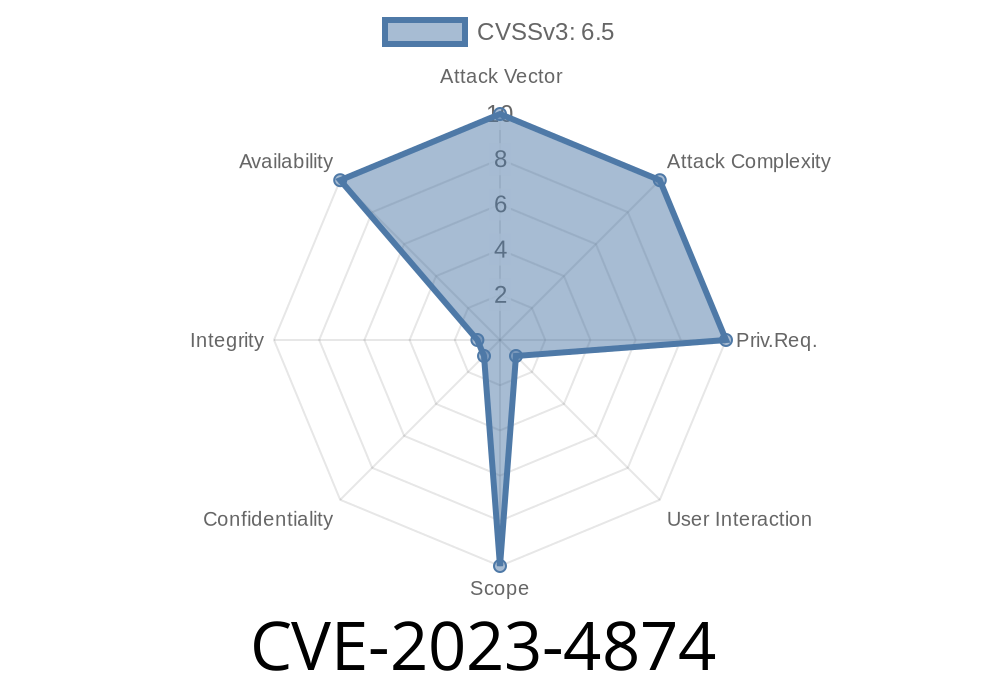Email clients are part of our daily internet life—even text-based ones, like Mutt. But even tools trusted by millions can have hidden dangers. In late 2023, researchers found a vulnerability in Mutt, tracked as CVE-2023-4874. In simple words, a clever attacker could send you a specially crafted email that would crash your Mutt session, possibly leading to a denial of service (DoS) and maybe more (depending on context).
Let’s break down how this vulnerability works, how you might be affected, and what you can do to stay safe.
What is CVE-2023-4874?
CVE-2023-4874 is a null pointer dereference vulnerability found in Mutt, a popular terminal-based mail user agent. It affects versions greater than 1.5.2 but less than 2.2.12.
A null pointer dereference means the program tries to read or write to memory at location x—which never leads to anything good. Usually, this makes the program crash.
In context, simply previewing or opening a specially crafted email in a vulnerable Mutt version is enough to trigger the bug.
Mutt >1.5.2 and <2.2.12
If you’re running the latest version (2.2.12 or newer), you’re not affected. But if you’re using an old version from your Linux package manager, especially on servers or older distributions, check your version using:
mutt -v
How the Exploit Works
When Mutt processes certain malformed or incomplete emails, it doesn’t properly check if pointers are valid before dereferencing them. This means an attacker can craft an email with tricky headers or body parts to trick Mutt into reading memory it shouldn’t.
Here’s a simplified, high-level breakdown
1. Attacker sends an email with malicious structure—missing expected attachments or malformed MIME headers.
Internally, Mutt tries to handle the email but ends up referencing a pointer that is NULL.
4. This causes Mutt to crash, interrupting your mail session or possibly affecting automated workflows if you process mail with scripts.
Example Malicious Email
Below is a simplified version of what an attacker’s malicious email might look like (for educational purposes):
From: evil@attacker.com
To: victim@example.com
Subject: You've got mail!
Content-Type: multipart/mixed; boundary="evilboundary"
--evilboundary
Content-Type: text/plain
Hello! Check the attachment!
--evilboundary
Content-Disposition: attachment
--evilboundary--
Notice that the attachment part is missing critical headers like filename and Content-Type. When Mutt tries to process this, older versions hit the vulnerable code path.
Vulnerable Code Snippet
The problem was traced to Mutt's handling of MIME parts. Here is a simplified C pseudo-snippet showing the idea:
void process_attachment(MimePart *part) {
if (part->type == MIME_ATTACHMENT) {
printf("Attachment: %s\n", part->filename);
// ...process further
}
}
If part->filename is NULL—which can happen with malformed emails—this crashes.
The fixed version adds a check
void process_attachment(MimePart *part) {
if (part->type == MIME_ATTACHMENT) {
if (part->filename != NULL)
printf("Attachment: %s\n", part->filename);
// ...process further
}
}
What’s the Real-World Impact?
- Denial of Service (DoS): If you’re processing emails with Mutt, a single crafted message can crash your session or automation.
- Possible Exploitation: While this bug only leads to a crash, if Mutt is scripted or used in chains, it may be leveraged for logic attacks.
Patch and Fix
The issue is fixed in Mutt 2.2.12 and above. The official changelog records the patch.
`
- Or manually download the latest release.
Original References
- Mutt Security Fix Announcement
- NIST NVD Entry for CVE-2023-4874
- Mutt GitLab Commit Fix
Final Words
CVE-2023-4874 is a great reminder: small, invisible bugs can have big real-world effects. Legit hackers can sometimes crash your tools armed with nothing but a raw email file. Upgrading your tools and practicing basic security hygiene matter—even when your tech tastes run retro.
Stay patched, stay safe, and double-check those weird emails!
Want to learn more?
Read the official Mutt documentation, or follow Openwall for the latest on open-source security.
Timeline
Published on: 09/09/2023 15:15:00 UTC
Last modified on: 09/27/2023 15:19:00 UTC
